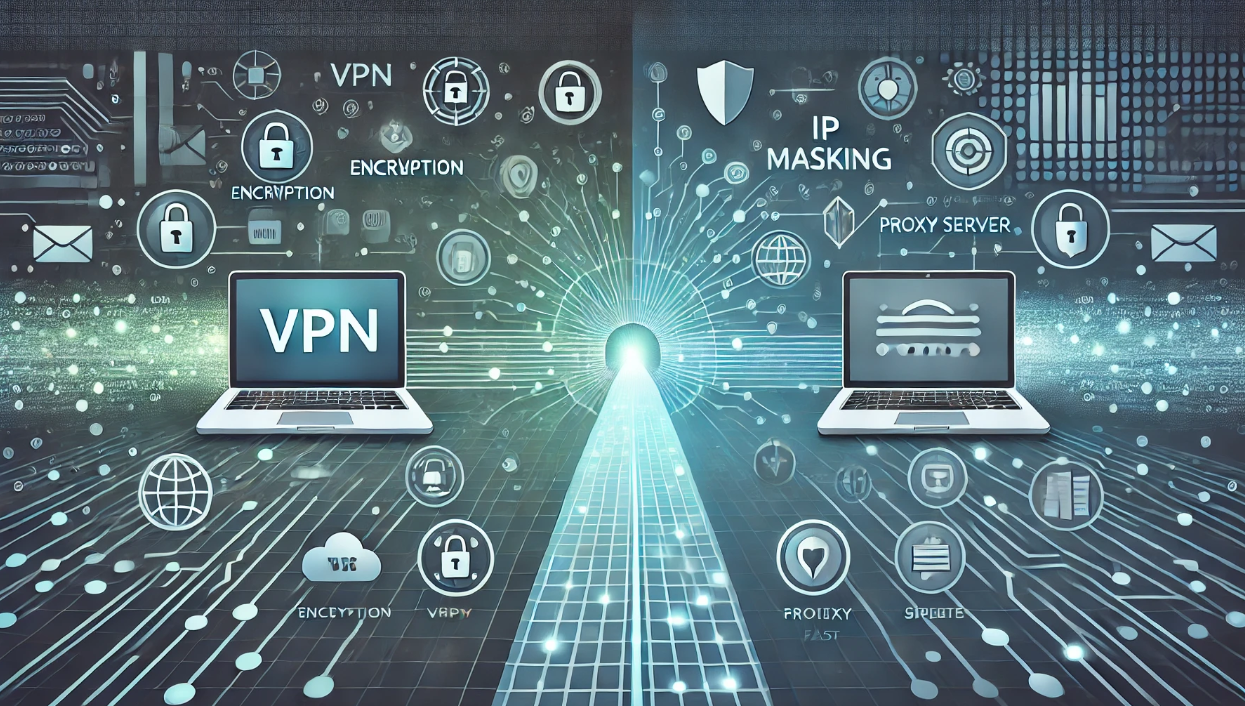VPN vs. Proxy: What’s the Difference and Which Should You Use?
When it comes to online privacy and anonymity, many users consider using a VPN (Virtual Private Network) or a proxy server. While both tools can help hide your IP address and grant access to geo-restricted content, they work in fundamentally different ways and offer varying levels of security and functionality.
In this guide, we’ll compare VPNs and proxies, explore their advantages and limitations, and help you determine which is best for your needs.
1. What Is a VPN?
How It Works
A VPN creates an encrypted tunnel between your device and a secure server operated by the VPN provider.
- Encrypts all Internet Traffic: Prevents hackers, ISPs, and government agencies from viewing your online activities.
- Masks Your IP Address: Assigns a new IP address, making it appear as though you are browsing from a different location.
- Works at the OS Level: Encrypts all data from any application or browser.
Advantages of VPNs
✅ Enhanced Security: Uses AES-256 encryption, the standard for military and financial institutions.
✅ Complete Anonymity: Hides your IP address and encrypts all data.
✅ Access Geo-Restricted Content: Stream services like Netflix, BBC iPlayer, and Hulu from anywhere.
✅ Bypass Censorship: Access blocked websites in restrictive countries.
✅ Protects on Public Wi-Fi: Secures data from man-in-the-middle attacks.
Common Use Cases for VPNs
- Privacy Protection: Shielding your data from ISPs and hackers.
- Streaming: Watching content available only in specific regions.
- Remote Work: Securely accessing company resources from anywhere.
- Torrenting: Safely downloading files via P2P networks.
Popular VPN Providers:
- NordVPN
- ExpressVPN
- CyberGhost
- Surfshark
2. What Is a Proxy?
How It Works
A proxy server acts as an intermediary between your device and the internet.
- Hides Your IP Address: Routes your internet traffic through the proxy server’s IP.
- Works at the Application Level: Typically configured for specific apps or browsers.
- No Encryption: Traffic between your device and the proxy is usually unencrypted.
Types of Proxy Servers
- HTTP Proxies
- Only work with web traffic (HTTP/HTTPS).
- Suitable for bypassing geo-restrictions or accessing blocked websites.
- SOCKS Proxies
- More versatile, handling various types of traffic (HTTP, FTP, etc.).
- Commonly used for torrenting or gaming.
Advantages of Proxies
✅ IP Masking: Hides your real IP address for anonymous browsing.
✅ Fast Connection Speeds: Minimal impact on internet speed.
✅ Easy Configuration: Set up in web browsers or specific applications.
Common Use Cases for Proxies
- Bypassing Website Blocks: Accessing region-restricted sites.
- Web Scraping: Gathering data from websites without getting blocked.
- School or Work Restrictions: Viewing blocked sites in restricted networks.
Popular Proxy Services:
- Smartproxy
- ProxySite
- HideMyAss
- KProxy
3. VPN vs. Proxy: Key Differences
| Feature | VPN | Proxy |
|---|---|---|
| Encryption | Yes (AES-256 encryption) | No (usually unencrypted) |
| IP Masking | Yes | Yes |
| Privacy Protection | High (Complete data encryption) | Low (No encryption) |
| Speed Impact | Moderate (encryption overhead) | Low (no encryption overhead) |
| Application Scope | System-wide (all apps and browsers) | Application-specific (browser or app) |
| Bypass Censorship | Yes | Limited |
| Ideal For | Privacy, streaming, remote work | Basic anonymity, bypassing blocks |
4. Security Implications
VPN Security
- Encryption: Encrypts all internet traffic, safeguarding sensitive data.
- Kill Switch: Disconnects the internet if the VPN connection drops, preventing data leaks.
- Zero-Logs Policy: Many VPNs, like ExpressVPN and NordVPN, commit to not storing user activity.
Proxy Security
- Lack of Encryption: Data remains unencrypted, making it vulnerable to interception.
- No Additional Features: Lacks kill switches or DNS leak protection.
- Free Proxies Are Risky: Often inject ads or malware and may sell user data.
5. When to Use a VPN
For Security and Privacy
- Protecting personal information on public Wi-Fi.
- Avoiding ISP throttling or surveillance.
- Encrypting sensitive communications.
For Streaming and Gaming
- Accessing geo-restricted content from streaming services.
- Reducing ping times in gaming by connecting to closer servers.
For Remote Work
- Securely accessing company resources or sensitive data from remote locations.
- Complying with corporate security policies.
6. When to Use a Proxy
For Simple Anonymity
- Accessing blocked websites in restricted networks (schools, workplaces).
- Masking IP address without needing full encryption.
For Web Scraping and Automation
- Gathering data from websites without IP bans.
- Bypassing geographical restrictions for automated tasks.
For Specific Applications
- Routing traffic for particular apps (e.g., torrent clients, web browsers) without affecting the whole system.
Conclusion
Choosing between a VPN and a proxy depends on your specific needs:
- Use a VPN if you prioritize security, privacy, and encryption. VPNs are ideal for protecting sensitive data, bypassing censorship, and securely accessing geo-restricted content.
- Opt for a proxy if you need basic anonymity, fast speeds, or bypassing simple website blocks without requiring full data encryption.
While both tools have their uses, a VPN offers comprehensive protection and greater functionality, making it the preferred choice for anyone serious about online security and privacy.

